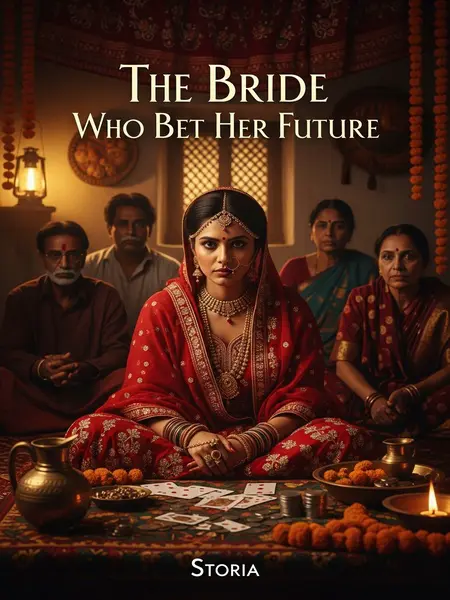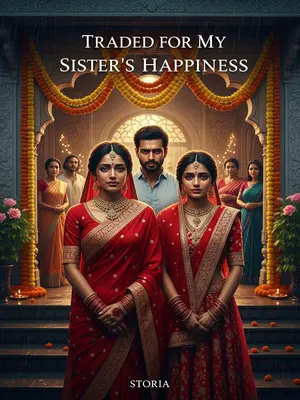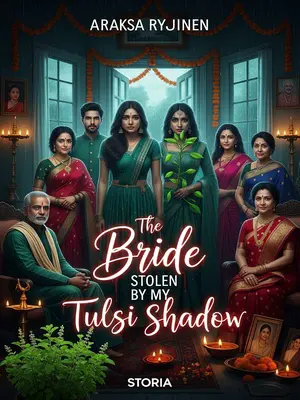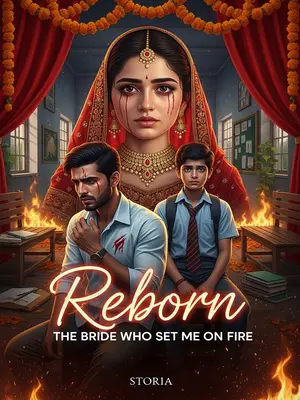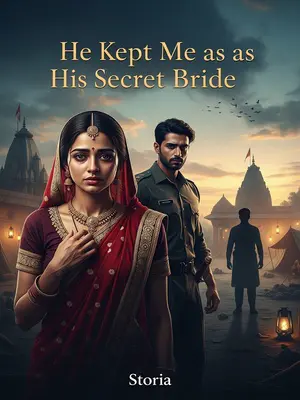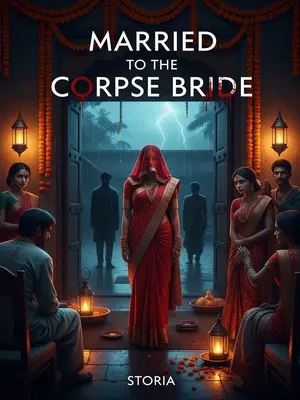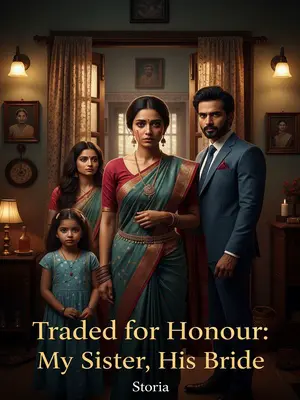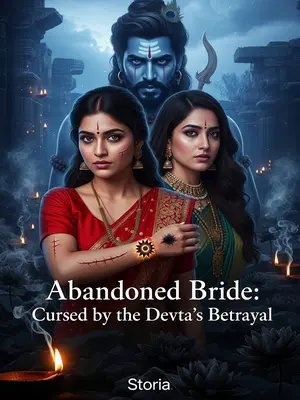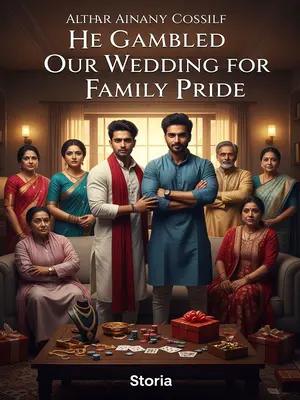Chapter 2: The Debt Revealed
I fumbled with my phone, opening PayTM, voice shaky but brisk. “Woh nasha mein hai, main transfer kar dungi. 38 ka kitna hota hai?”
“Teen lakh assi hazaar.”
The words slapped me. A cup clattered to the floor. The room shrank.
I thought I misheard. “Kitna?”
Again: “Teen lakh assi hazaar.”
No mistake. My head spun. Women in the corridor gasped, covering their mouths.
“Dus hazaar per chip?”
Chacha ji pointed at the chips, as if offended. “Wahi toh likha hai, dekh lo. Dus hazaar ka ek.”
I put down my phone, voice trembling. “Aap log itne bade daav pe khel rahe ho?”
My fingers dug into my palm, but I kept my voice steady.
Chacha ji shrugged, “Aapke pati ne hi toh mazaa badhane ko kaha tha. Dus hazaar per chip.” The others nodded, shifting blame with practiced ease.
I leaned close to Arjun, whispering, “Samajh rahe ho? Teen lakh assi hazaar haara hai tumne.”
He gave a sheepish smile, hugging me, whiskey breath warm. “Main bas... tumhe khush karna tha... poha nahi khana... bas izzat bachana tha.”
His innocence was infuriating. I remembered our breakfasts, his teasing about my poha. That memory stung now.
He once promised: if he ever gambled, he’d be reborn as a donkey for three lifetimes. That vow echoed in my head. I glared, imagining donkey ears sprouting on him, biting back a tirade.
“Chacha ji, Mausi, aap toh bade ho. Damaad hai, usko kyun phasaya?” I raised my voice, making sure everyone heard.
Mausi pulled me aside, hissing, “Aise kaise bol sakti ho? Kal ko kaun khele card? Mujhe hi toh rokna pada, warna ek lakh per chip ho jata. Shukr manao.”
Her logic was twisted. She wanted me to feel grateful for her so-called mercy.
“Teen lakh assi hazaar zyada hai. Ye toh jurm hai. Main sabko ek-ek hazaar bhej deti hoon, shadi ka shukriya samajh lo.”
I tried to inject reason, even forcing a smile, hoping someone would see sense.
Silence. No one met my eyes. The lights felt harsh, the room cold.
Hazaar per aadmi, paanch hazaar total. Yahan ke liye toh do-teen mahine ka kharcha hai. But greed blinded them.
Still, Chacha ji and the others just stared, neither agreeing nor refusing.
Their silence was chilling. I realised—this wasn’t about money. It was about power and pride. If I fail, this room will never let me forget it.
A gravelly old voice cut through the tension: “Daav laga toh bharo. Khel khatam, paisa pakka. Ulta seedha mat socho.”
Everyone fell silent. Dadi’s sister’s husband sat in his favourite chair, sandalwood tilak on his forehead, eyes hard as stone.
I tried one last threat. “Dadaji, teen lakh assi hazaar—police aa gayi toh sab band ho jayega.”
He scoffed, “Police bulaogi kya? Shaadi ka mahaul kharab ho jayega. Idhar kanoon mera hai.” The crowd murmured, “Arrey, police bulayegi kya? Shaadi ka mahaul kharab ho jayega.”
He’d just blessed us at the banquet. Now, he was unmoved, the family judge. The betrayal stung.
Faces around me were unreadable—some averted, some smirking, some calculating. The warmth of family was gone, replaced by cold hunger.
Suddenly, I understood. The setup, the sympathy, the high stakes. My heart hammered. This was a trap.
“You did this on purpose.” My voice was barely a whisper, but the accusation hung in the air.
Chacha ji patted my shoulder, singsong: “Jeet-haar toh kismat ka khel hai, beta. Aaj nahi toh kal sab barobar ho jaata hai. Don’t look so serious.” The others nodded, pretending this was harmless fun.
“So if I don’t pay, you won’t let us leave?” I raised my chin, daring them.
“Kaise rok sakte hain? Beta ka karz, baap chukata hai. Aapke maa-baap bhi de sakte hain.” The implication stung. “Log kya kahenge?” That was the real weapon.
If my parents could pay three lakh eighty thousand, why would we have a tent wedding?
They’d set us up, ready to shame us for life if we didn’t pay.
Mausi’s voice rose, “Shaadi mein toh bola tha, teen lakh assi hazaar ka dahej diya. Amiri ka dikhawa mat karo.”
That dowry was staged. My husband, an orphan, and I had saved every rupee, only so people wouldn’t gossip about my marrying him. The plan was always to get it back for our future child’s education. I’d told my dad not to mention it, but pride and whisky loosened his tongue. And now, the loss matched the dowry—leaving us just eight thousand. The calculation was almost cruel.
Mausi jabbed a finger at the door. “Tumhare maa-baap aa gaye.”
My parents entered with my brother, still smiling, but their faces fell as they saw the scene. My father boomed, “Abhi tak khel rahe ho? Khelo, yahan toh yehi entertainment hai!” But his eyes narrowed.
I snapped, “Kya khel? Damad ji teen lakh assi hazaar haara hai. Chacha ji, Mausi paisa maang rahe hain.”
My father’s smile vanished. My mother’s hand flew to her mouth, bangles jangling. “Kya?”
“Teen lakh assi hazaar!” My voice shook. The corridor outside filled with eager faces.
“Teen lakh assi hazaar? Kaun?”
“Tumhare damad, pagal ho kar haara.”
My dad looked stunned. “Sach?”
Chacha ji replied, “Bhai sahib, yahan table par baap-bete nahi hote. Damad ji hi haare. Sabne dekha.” He gestured to the crowd, who nodded eagerly.
My mom screamed and collapsed. My brother caught her. Aunties rushed in, sprinkling water on her face and murmuring, “Ram naam satya hai,” as if warding off evil.
“Teen lakh assi hazaar? Isse toh chaar manzil ka ghar ban jata! Ab kya karein?”
She sobbed. My brother put an arm around her, eyes wide, helpless.
The commotion drew the whole mohalla. Neighbours pressed in, someone snapped a photo, another whispered, “Aaj toh naya hungama hua.”
Chacha ji tried to sound generous, “Bada daav hai, par damad ji ne hi maana tha. Jeet raha tha, bas end mein haar gaya. Kismat ka khel hai. Kuch aur khel lo, wapas jeet sakte ho.”
The crowd nodded. “Haan bhai, kismat idhar-udhar.”
My dad turned to me, “Beta, tumne toh nahi khela?” His voice was gentle, eyes pleading for denial.
I shook my head. “Jab aayi, tabhi yeh ho chuka tha.”
Relief flickered across his face, but the problem remained.
He patted Arjun, “Hamare liye izzat sabse upar hai. Damad bhi beta hai—haara toh haara. Jitna bhi ho, sweekar karenge.” His voice was steely. In our world, izzat is everything.
I was stunned. I could have argued, threatened police, but now it was as if my family had agreed to the debt. My last defence was gone.
My father pulled me aside, voice grave, “Kabhi beizzati nahi dekhi is gaon mein. Damad ka chehra bachana hai. Ghar bech denge, bachat khatam, shaadi ka paisa de denge. Kaam bhi kar lenge. Lekin logon ke saamne jhukenge nahi.” His hand gripped mine, rough from years of work, now trembling as he signed the IOU. My heart shattered.
My brother hugged my mom, “Didi, main kama lunga. Darna kaisa?” He tried to be brave, voice trembling.
Izzat was our everything. But it hurt to see it play out.
Arjun woke up, staggered to me, and hugged me, mumbling, “Main jeet ke launga.”
The rage surged again. My fists clenched. I was a hair away from slapping him awake.
His easygoing innocence—what I loved most, now his biggest flaw. I realised love alone wouldn’t save us from this world.
Chacha ji said, “Bhai sahib ne keh diya, toh bas. Ek IOU likh do, aaj ka hisaab ho gaya.” He pulled out a notepad, as if waiting for this.
Mausi produced a pen. My father’s hand shook as he wrote, the pen scratching wobbly letters. My mother watched, eyes full of tears, as if we were signing away our future.
